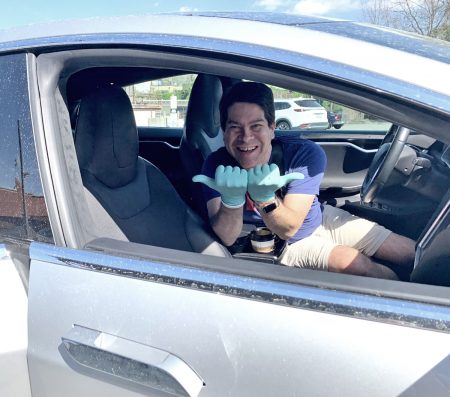
From left, Nathalie Kauz, Alyzia McAlmon, Matt Hickson pick up materials for meal delivery – and staying six feet apart! (Photo courtesy of DPSF)
As the COVID-19 threat continues and thousands of families and children face hunger every day, Durham residents are mobilizing to deliver hot meals to make sure no one goes hungry.
Durham Public Schools Foundation strives to support food security and remote learning for students due to public school closures caused by the coronavirus in North Carolina.

DPSF is an independent nonprofit that aims to strengthen Durham Public Schools for all students. However, Executive Director Magan Gonzales-Smith said the coronavirus has impacted DPSF’s mission.
“Many thousands of students depend on school for one, sometimes two meals each day,” Gonzales-Smith said. “Food insecurity became our top concern following the announcement of DPS school closures due to coronavirus. We immediately pivoted our work to meet this urgent need.”
Katie Wright, the development and communications specialist at DPSF, said the foundation started raising funds to directly support students. They have raised more than $100,000 in the last couple of weeks.
DPS closed March 16 but did not provide their meal service program until March 23. Because of this, Wright said DPSF started working on a plan to provide immediate relief.
“We created a form in Spanish and English that allowed families to sign up to receive a meal delivered to their door,” Wright said. “We sent out that form through DPS’s network and phone service and had 1,000 families sign up within the first 48 hours.”
DPSF then started to coordinate with volunteers to deliver the meals. The service required 34 volunteers to each deliver 12 to 15 meals on March 20 and 21.
“We put out a call for volunteers, and this was amazing – we got 800 people,” Wright said. “We were completely overwhelmed by that response of outpouring from the community.”
DPSF partnered with caterers and local restaurants to find a price point for the meals that would both stretch their donation dollars and employ service industry workers.
At the meal pickup location, the volunteers practiced different safety measures, such as sanitizing steering wheels and door handles.
Wright said the meal delivery program took place again on March 27 and 28. She said DPSF also delivered grade-level-appropriate books from Book Harvest to families in order to build on the program.
Dave Becker, social studies teacher at Josephine Dobbs Clement Early College High School, volunteered to deliver meals to families on March 27. He said he wanted to do his part to help DPS students.
“For most teachers at this weird time, it’s very difficult to be away from our students, because we do a lot more than instruct them,” Becker said. “I felt like this was a way that I could keep that connection, even though it wasn’t necessarily delivering to my specific students.”
DPSF is still continuing to raise money. Wright said some funds go toward the meal relief program, but most of the money is set aside to give DPS access to immediate, flexible funds as different needs emerge.
Wright said she is looking forward to developing and sharing the tools and infrastructure DPSF built.
“We’ve just seen this model work well in the initial week,” Wright said. “And we’re hoping to be able to share that out, so that even more families across North Carolina can get that support.”